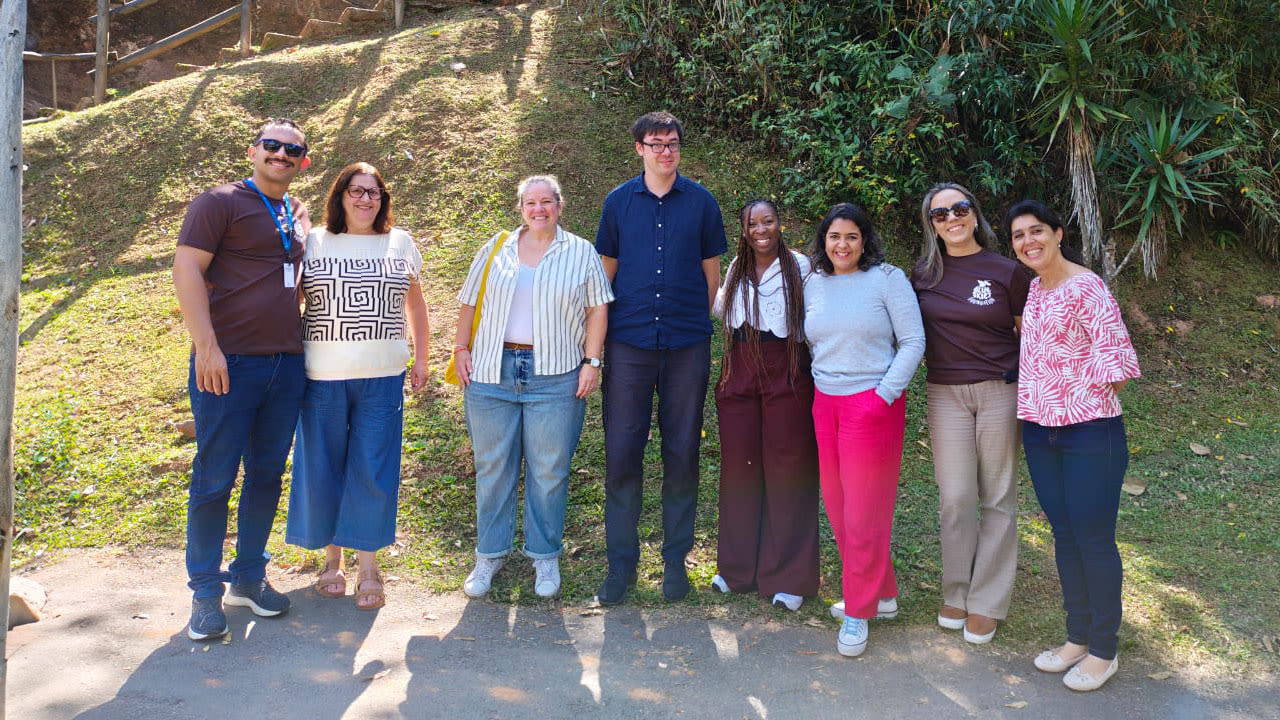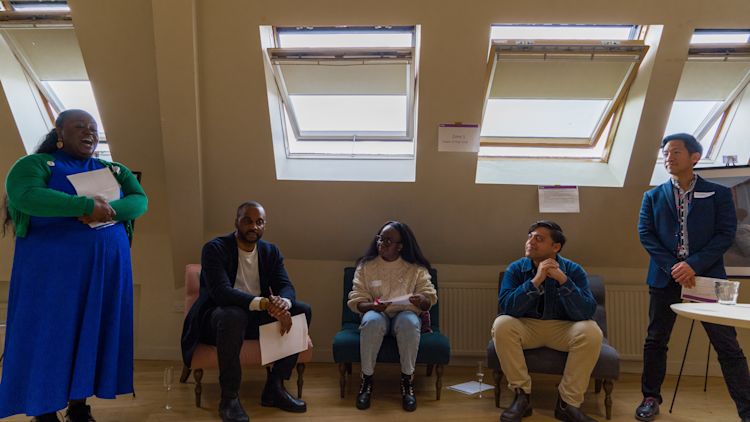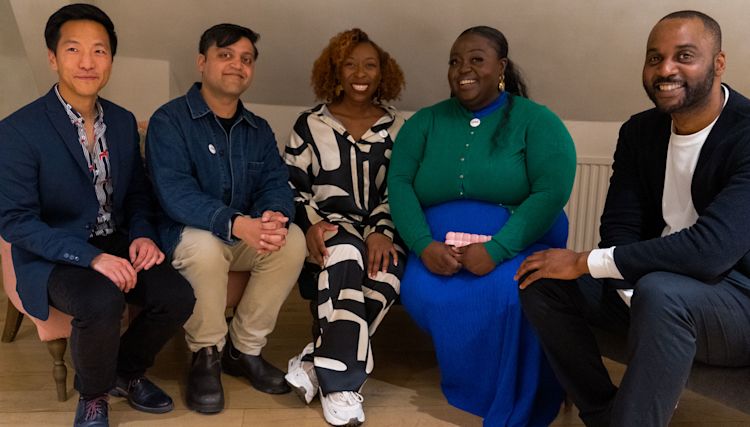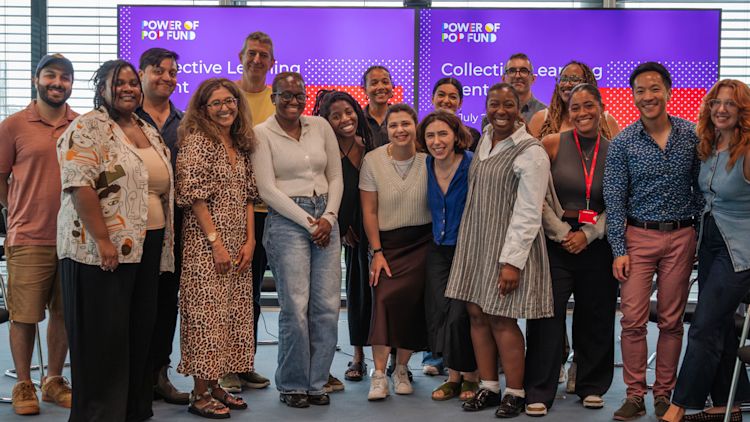
Words by Maxine Thomas-Asante, Allison Robertshaw and Jonathan White.
“[We need] for everyone to work together to fill in the gaps and transform society.” - Climate Justice Funded Partner
August 2025 was a significant month in philanthropy in Brazil, bringing together both Rio Climate Action Week and a revitalised Black Philanthropy Month. As the month drew to a close, our Head of Climate Justice, Senior MEL Manager, and POP Fund Lead travelled to São Paulo and Rio de Janeiro. Their mission: to connect with partner organisations and thought leaders whose work advances climate justice through resilience, cultural strategy and anticipatory social protection. This trip was a chance not just to strengthen relationships but also to learn more about Brazil —about what’s working, what isn’t, and how Comic Relief’s funding can have the greatest impact.
We engaged with funded partners including Casa Fundo Ambiental, Instituto Fome Zero, ICCI, and Fundación Avina, as well as other inspiring organisations such as Estudio Clarice, Terra FC, Labóra, Morada Comum, and the Blue Skies Foundation.
Climate Justice in the Spotlight
This year’s urgency is heightened by the upcoming COP30 in November, to be hosted in Brazil. COP represents an opportunity for world leaders and civil society to advance international climate action. Hosting it in Brazil also places Global South leadership at the forefront of the climate justice conversation, as it turns the world’s attention on such critical issues as climate resilience and adaptation, food security, indigenous peoples and local communities’ rights, and the intersection of climate change and sustainable economic development.
Many of the organisations we met with are deeply engaged in strategising around COP—yet they also reminded us that the climate crisis does not pause for summits. Brazil, like every country, is already experiencing its impacts such as the devastating Rio Grande do Sol floods in April 2024, and those challenges will remain long after COP30 ends. Our time in Brazil was a vivid reminder of a civil society in motion, building towards long-term change.
Innovation on the Ground
One of the most inspiring elements of our trip was witnessing the innovation and experimentation fuelling advances in climate justice. Comic Relief remains committed to our work in Brazil, with the climate justice strategy highlighting Anticipatory Social Protection, climate resilience, and the need to support climate narratives that engage communities in new and culturally relevant ways, as are our partners who deliver incredible programming towards these aims.
From funded partners developing proximate approaches to fund local communities whose “very way of life” mitigates against climate disaster to upskilling journalists and representatives to better speak on social and environmental justice, it was clear that meaningful impact is being cultivated. One of the challenges that can arise from innovative programming is the struggle of translation.
Fresh ideas take time to imagine, design and execute, and the philanthropic community needs to be willing to work with partners over time to see tangible, locally relevant results rather than demanding immediate change to meet our own self-imposed impact metrics. Our approach to funding needs to value and champion such innovation for it to survive. We were reminded that innovative ideas take time to grow:
“It takes years to develop an explanation that people can connect with” - Climate Justice Funded Partner
Our role as funders is not just to support programmes but to champion the patience and creativity that innovation requires.

Honouring the Past, Imagining the Future
In Rio, we also attended GIFE’s Black Philanthropy Month event, Sankofa: Memory and Reparation. GIFE is an association of private social investors in Brazil, whether they are institutes, foundations or family funds, independent corporations or companies. During this event, we heard about the importance of racial justice towards building generative economies, sustainable environments and strong democracies. In a country where Black and mixed-race people now represent 55.5% of the population according to the 2022 census, for too long the climate funding community has neglected to fund their work. The very real interplay between climate justice and racial justice is one that we see across the globe, both in the Global North and the Global South. The central message was clear:
“We need to honour the past and reflect in the present to imagine the future”. - Dr. Jackie Bouvier Copeland

At Comic Relief, sport and pop culture are at the heart of what we do. From music to sport, trusted messengers play a vital role in mobilising communities. One standout example was Terra FC, hosted by Fluminense alongside other Brazilian football clubs. By rallying fanbases around the idea that “we are all part of Team Earth”, Terra FC has inspired school children and football fans alike to “score a goal for the planet.”
We learned that for climate action to be successful it needs to be adopted and pushed for by all parts of Brazilian society. Therefore, supporting diverse approaches championed by different organisations that speak to different audiences is key.
Key Takeaways From 10 Days in Brazil:
🌎 Climate justice, democracy and racial justice are deeply interlinked.
🌎 We can no longer just think about preventing climate change - we must also reckon with and adapt to its impacts.
🌎 Change doesn’t end when a conference does—it must continue beyond the spotlight.
🌎 Proximate funding, led by those within the movement, can enable real power sharing and innovation.
🌎Meaningful and equitable collaboration between actors in the global south and north is essential.
🌎 Civic power—through both consumer choices and civic rights—matters.
🌎 Pop culture helps translate systemic challenges into lived realities that people can act on.
🌎 Funders should be open to adopting definitions of impact that are defined by and therefore reflect the needs, priorities and visions of local communities most affected by climate change.
As the trip drew to a close, there was one question left to ask, what can we do individually, collectively and systemically to really bring about climate justice? It is clear in no uncertain terms, that the time to act is now.


